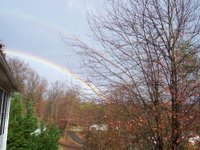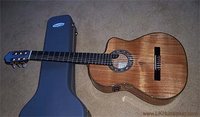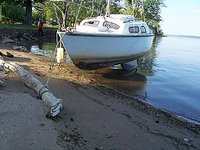"Chi rispotta sara' rispottato."
(Respect others and you will be respected.)
-- Italian Proverb --
There is a "celebrity blogger" being sued by the paparazzi: a rather ridiculous thing by the sound of it. I find it deplorable for people to stalk and otherwise harass other people in the guise of "freedom of the press" simply because photos and stories (true and otherwise) of those being stalked bring in big money. It's truly disgusting and should be illegal.
On the other hand, this blogger is making money from those doing the stalking by doing something unquestionably illegal: reprinting photos taken by others on his blog with no permission and no credit given. This is outright copyright infringement. He is claiming "fair use" under the copyright act. As a writer/artist, I have studied the copyright laws enough to know that the way he is using the photos, by drawing a couple of scribbles on them and sticking rude captions underneath, is not at all fair use. Fair use was issued for educational reasons. It gives us the right to use quotes as long as they are brief and acknowledged. It also gives us the right to show photos of artwork for an educational purpose, again with credit given.
While checking into the creation of my own website, I read that section thoroughly: the one he is quoting as fair use that says if he changes it, it becomes legal. That's not what it says. It says there must be a considerable change and even then, the law is hazy and it would come down to how and why it's being used. In general, if it is being used for purposes of making income, it's not legal. The biggest issue is whether it interferes with the owner's income as competition. That is a cut and dry illegal act.
I'm mentioning this here because of the widespread copyright infringement happening online. It is not legal to copy photos/graphics/text online and use it for your own purposes without express permission from its owner. That goes for any kind of art, including literature.
One of the comments in that blog mentioned something I've heard ranted about before; that copyright laws should be repealed. This apparently comes from those who have never in their lives created an original work and never intend to do so. My question to those people would be, "Why should everyone except artists expect to make money from what they do?" Or, "Why should certain artists be allowed income from their work while others aren't?"
When a man contructs a beautiful oak rocking chair from his own labor, no one is allowed to walk into his house and take it away. It's stealing and it's illegal. When I sit down and write or create graphics, I am putting my time and learned craft into it in the same manner and my work belongs to me. The photos I take and include in my blog and on my site belong to me. Copying them without my permission is stealing. The same goes for everything anyone creates.
A photo is a creation. It takes skill and knowledge and effort to create a good photograph. I disagree about the ethics of the paparazzi, but it is not illegal. Even if it were, two illegal acts do not cancel each other. Copyright infringement is illegal. Plagiarism gets college students kicked out of school and adults fined. It is all the same issue. Art is meant to be shared with others, by permission of the artist. It is not meant to be stolen.
Most often, if photos are used and linked back to the owner's site with full credit given, there isn't an issue made of it, especially when it is on a non-income-earning site. Some artists would welcome that as additional exposure. However, they could very well make a legal stand if they chose to do so, even with full credit.
The bottom line is that artists deserve respect for their work. They deserve the same protection others have when it comes to earning a living. Grabbing art that is someone's livlihood (or even if it's only a hobby) is the same as walking into someone's house and pulling out one of her belongings.
If we wish to continue having art in our society, we must continue respecting our artists.
-- story link: http://movies.msn.com/movies/article.aspx?news=245243>1=7701










